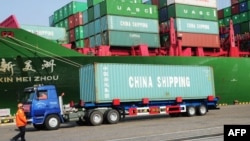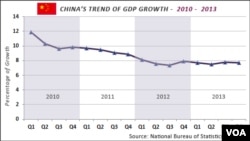BEIJING —
Chinese officials say the country’s economy maintained a flat growth of 7.7 percent last year, matching the weakest annual performance since 1999. The slowdown comes as China’s leaders seek to push a wide range of reforms that could slow the country’s growth even further.
China’s annual growth for 2013 was still stronger than Japan, the United States or Europe.
Chinese officials were quick to put a positive spin on the number, noting that it was still above their projection of 7.5 percent.
Ma Jiantan, director of China’s National Bureau of Statistics, said it is no simple task to keep growth at 7.7 percent and the increase in the price of goods at 2.6 percent, but that is what China has done. And it is something that is unique in the entire world, he added.
Ma said China’s ability to continue to see stable growth for its economy highlights the effectiveness of the central government’s efforts to promote reform as it gradually adjusts the Chinese economy.
Up until recently, the economy was seeing double-digit annual growth, lifted up by heavy investment and reliance on exports. But now, China is seeking to shift away from that model to focus on an approach that is more balanced between exports and domestic demand.
They are seeking an economy that relies less on state control and allows market forces freer play.
Economists expect China’s growth to continue to slow in the coming years, but the rate at which it slows depends on several factors.
One of the key challenges this year is managing the country’s rapidly expanding local government debt, analysts say.
China says its local governments have amassed about $3 trillion in debt, and the central government is tightening credit and cracking down on unregulated lenders known as shadow banks.
Shen Jianguang, an economist at Mizuho Securities Asia, said a big risk for this year is a sharp deceleration in investment. “I think the Chinese government, especially the central bank has a great dilemma now, because on the one hand they need to deleverage and crack down on shadow banking activity, but on the other hand they also need to make sure this isolated credit default event will not evolve into a full blown financial crisis,” said Shen.
While reforms could create opportunities, they also could slow growth. China has long pinned its evaluation of local officials on their ability to grow the economy.
The central government now is shifting its focus away from economic growth, though, to areas such as environmental protection and local officials' ability to contain debt. That, economists say, also could weaken investment and slow growth.
At the same time, analysts say the recovery of the U.S. economy and improvements in Europe could help to breath some life back into China’s exports.
In an earlier version of this story we incorrectly reported that China's growth was down slightly from last year. In fact it was flat from last year. VOA regrets the error.
China’s annual growth for 2013 was still stronger than Japan, the United States or Europe.
Chinese officials were quick to put a positive spin on the number, noting that it was still above their projection of 7.5 percent.
Ma Jiantan, director of China’s National Bureau of Statistics, said it is no simple task to keep growth at 7.7 percent and the increase in the price of goods at 2.6 percent, but that is what China has done. And it is something that is unique in the entire world, he added.
Ma said China’s ability to continue to see stable growth for its economy highlights the effectiveness of the central government’s efforts to promote reform as it gradually adjusts the Chinese economy.
Up until recently, the economy was seeing double-digit annual growth, lifted up by heavy investment and reliance on exports. But now, China is seeking to shift away from that model to focus on an approach that is more balanced between exports and domestic demand.
They are seeking an economy that relies less on state control and allows market forces freer play.
Economists expect China’s growth to continue to slow in the coming years, but the rate at which it slows depends on several factors.
One of the key challenges this year is managing the country’s rapidly expanding local government debt, analysts say.
China says its local governments have amassed about $3 trillion in debt, and the central government is tightening credit and cracking down on unregulated lenders known as shadow banks.
Shen Jianguang, an economist at Mizuho Securities Asia, said a big risk for this year is a sharp deceleration in investment. “I think the Chinese government, especially the central bank has a great dilemma now, because on the one hand they need to deleverage and crack down on shadow banking activity, but on the other hand they also need to make sure this isolated credit default event will not evolve into a full blown financial crisis,” said Shen.
While reforms could create opportunities, they also could slow growth. China has long pinned its evaluation of local officials on their ability to grow the economy.
The central government now is shifting its focus away from economic growth, though, to areas such as environmental protection and local officials' ability to contain debt. That, economists say, also could weaken investment and slow growth.
At the same time, analysts say the recovery of the U.S. economy and improvements in Europe could help to breath some life back into China’s exports.
In an earlier version of this story we incorrectly reported that China's growth was down slightly from last year. In fact it was flat from last year. VOA regrets the error.









